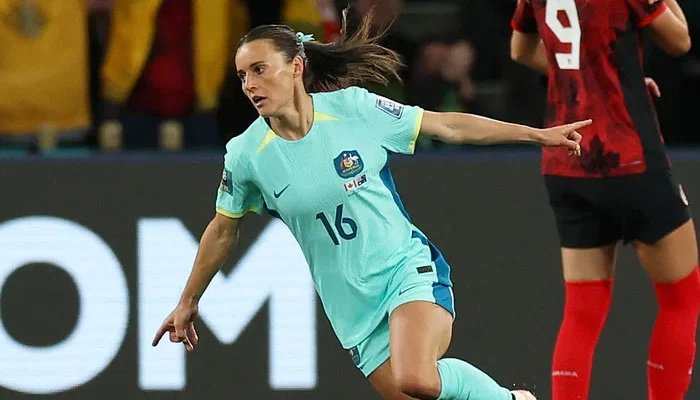Australia showcased their fighting spirit and secured their spot in the last-16 stage of the Women’s World Cup with an impressive thrashing of Canada.
Hayley Raso’s brace, along with goals from Mary Fowler and Steph Catley’s late penalty, propelled the co-hosts to a resounding victory in a must-win game to avoid elimination.
The Matildas finished at the top of Group B, proving their mettle even without star player Sam Kerr, who remained an unused substitute despite declaring herself fit.
In a historic outcome for Canada, they experienced their first group-stage exit from the Women’s World Cup since 2011. The defeat left them disappointed as they bid farewell to the tournament.
Following Nigeria’s draw with the Republic of Ireland, Australia confirmed their progression to the next stage, where they will face the runners-up from Group D, which could potentially be England. The highly anticipated clash is scheduled to take place at Stadium Australia in Sydney on 7 August.
Australia’s journey to this victory was fraught with tension and uncertainty, with the looming threat of an early elimination and the uncertainty surrounding Sam Kerr’s fitness. However, the 11 determined women on the field proved their resilience and determination to overcome the challenges.
In front of a boisterous near-capacity crowd at the Melbourne Rectangular Stadium, the Australian team exhibited remarkable speed and dynamism, outshining their Canadian counterparts. Hayley Raso’s well-controlled shot found the back of the net, setting the tone for Australia’s dominance.
A goalmouth scramble denied Mary Fowler a chance to double the lead, but Raso capitalised on another opportunity just before halftime. The second half showcased Australia’s relentless attack, with Caitlin Foord’s assist allowing Fowler to score off the post. Steph Catley sealed the deal with a penalty kick, cementing Australia’s commanding victory.
For Canada, the journey came to an unexpected end, and they were unable to emulate the achievements of holding both the World Cup and Olympic crowns simultaneously, a feat accomplished by the United States in 1999 and 2015. The Canadians struggled to find their footing against a fired-up Australian side and were left frustrated throughout the match.
The exit also meant that Canadian forward Christine Sinclair, aged 40, missed the opportunity to become the first player to score in six World Cups. Despite their disappointment, Canada’s journey in the Women’s World Cup has undoubtedly left a lasting impact on the tournament’s history.



Comments are closed.